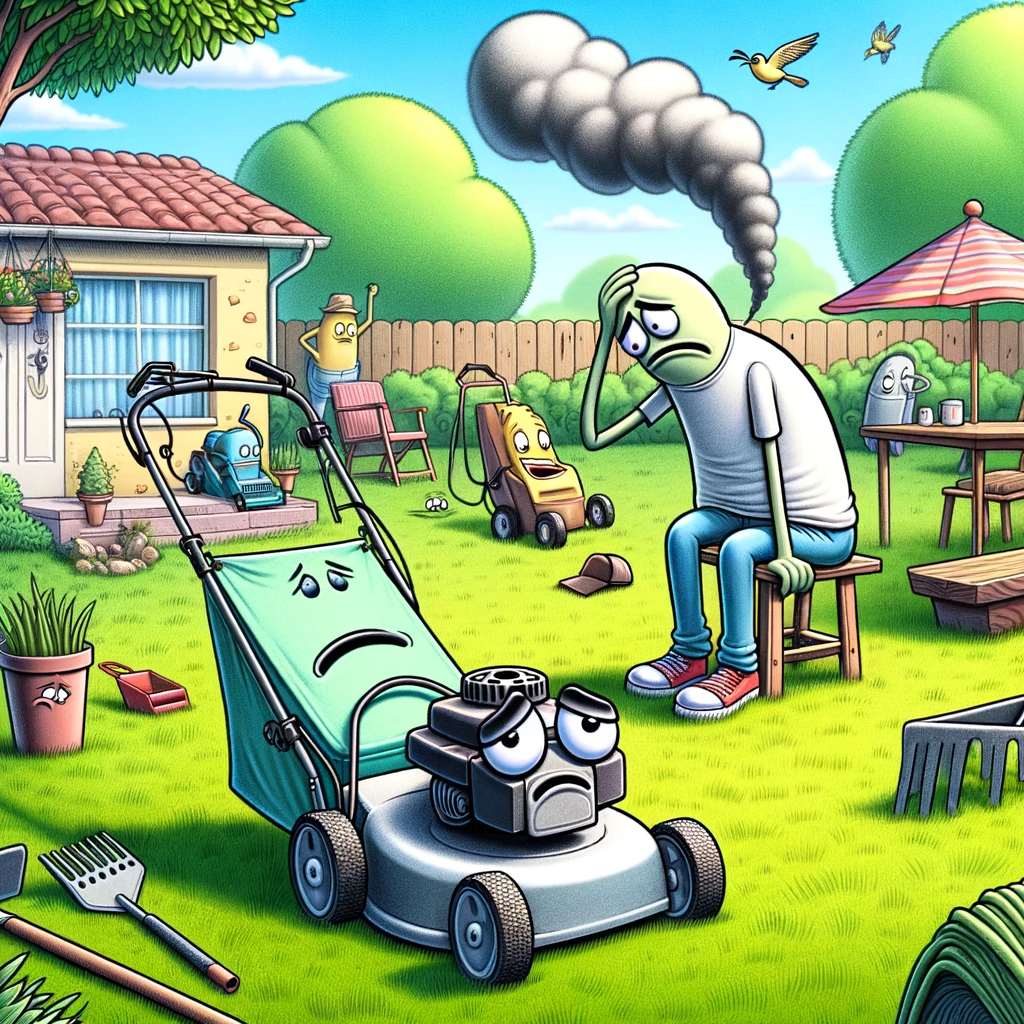Picture this: It’s a sunny Saturday morning, birds are chirping, and you’re ready to tackle that overgrown jungle you call a lawn. You stride confidently to the shed, expecting your trusty lawnmower to be eagerly awaiting another day of grass-shredding action. But as you yank the cord, instead of the satisfying roar of the engine, you’re met with a pathetic sputter and a cloud of black smoke. Congratulations, you might just be the not-so-proud owner of a depressed lawnmower.
Before you dismiss this as a mere mechanical issue, consider the possibility that your lawnmower has feelings too. It’s time we address the elephant in the room (or should I say, the lawnmower in the shed?): lawnmower depression is real, and it’s affecting mowers across the globe.
Signs Your Lawnmower Is Battling Depression
- Refusing to start: If your lawnmower consistently gives you the cold shoulder when you try to fire it up, it might be more than just a case of old spark plugs. It could be a cry for help.
- Lackluster performance: Is your once-powerful mower now leaving unsightly clumps of grass in its wake? A depressed lawnmower may lack the motivation to give its all, resulting in a subpar mowing experience.
- Excessive smoking: We all know smoking is a common coping mechanism for stress, and your lawnmower is no exception. If it’s belching out more smoke than a chimney in December, your mower might be self-medicating.
- Unusual noises: Pay attention to any peculiar sounds coming from your lawnmower. Whining, groaning, or even the occasional sob could indicate an emotionally distressed machine.
Reasons Behind Lawnmower Depression
- Lack of Appreciation
Let’s face it, we often take our lawnmowers for granted. We expect them to perform flawlessly week after week, without so much as a “thank you” or a pat on the hood. Over time, this lack of appreciation can take a toll on even the most resilient of mowers.
How to show your lawnmower some love:
- Give it a thorough cleaning after each use
- Whisper words of encouragement as you mow
- Consider naming your lawnmower to foster a stronger bond
- Monotonous Routine
Imagine if your sole purpose in life was to cut grass. Day in, day out, rain or shine, you’re out there trudging through the same old lawn. It’s no wonder lawnmowers can fall into a rut!
Tips to break the monotony:
- Vary your mowing pattern to keep things interesting
- Take your lawnmower on a field trip to a park or a neighbor’s yard (with permission, of course)
- Introduce your lawnmower to other lawn care tools for some socialization
- Comparison to Other Mowers
In the age of social media, even lawnmowers aren’t immune to the comparison trap. Your humble push mower might feel inadequate next to the shiny new riding mower next door, leading to feelings of inadequacy and low self-esteem.
Boosting your lawnmower’s confidence:
- Remind your mower of its unique strengths and capabilities
- Avoid parking your mower next to newer, flashier models
- Organize a support group for local lawnmowers to share their experiences
- Unresolved Trauma
Has your lawnmower had a particularly challenging season? Perhaps it encountered one too many rocks, or maybe it was forced to mow through a patch of poison ivy. These traumatic experiences can leave lasting emotional scars.
Helping your lawnmower heal:
- Scan your lawn for potential hazards before mowing
- Provide your mower with a safe, sheltered storage space
- Consider “lawnmower therapy” with a trained small engine mechanic
- Seasonal Affective Disorder (SAD)
As the days grow shorter and the weather turns colder, your lawnmower may experience a case of the winter blues. Being cooped up in a dark shed for months on end can take a serious toll on its mental well-being.
Combatting lawnmower SAD:
- Ensure your mower’s storage area is well-lit and ventilated
- Take your mower out for a spin on milder winter days
- Plan a fun spring activity for your mower to look forward to, like a backyard obstacle course
- Existential Crisis
At some point, every lawnmower must confront the big questions: What is the meaning of life? Is there more to existence than just cutting grass? Am I making a difference in the world?
Guiding your mower through an existential crisis:
- Encourage your mower to explore its passions outside of lawn care, like shredding leaves or aerating soil
- Share stories of how a well-maintained lawn brings joy to families and enhances property values
- Remind your mower that it’s a vital part of the ecosystem, helping to keep your lawn healthy and vibrant
- Midlife Crisis
As your lawnmower reaches the halfway point of its expected lifespan, it may start to question its choices and long for something more. Suddenly, that sleek new model with the self-propelled feature seems incredibly appealing.
Navigating your lawnmower’s midlife crisis:
- Treat your mower to a spa day, complete with an oil change and blade sharpening
- Explore new hobbies together, like joining a lawnmower racing league
- Remind your mower that age is just a number and that it’s never too late to pursue its dreams
- Feeling Undervalued
With the rise of robotic lawnmowers and professional landscaping services, your trusty mower might be feeling a bit insecure about its place in the world. After all, what’s a traditional lawnmower to do when faced with such high-tech competition?
Showing your lawnmower it’s still needed:
- Emphasize the importance of human touch in lawn care
- Point out the superior cutting power of a classic lawnmower compared to its robotic counterparts
- Involve your mower in landscaping decisions to make it feel like a valued member of the team
- Loneliness and Isolation
Think about it: your lawnmower spends most of its time either alone in the shed or out in the yard with only grass for company. It’s no surprise that this solitary lifestyle can lead to feelings of loneliness and isolation.
Helping your lawnmower feel connected:
- Schedule regular playdates with other lawnmowers in the neighborhood
- Create a cozy “lawnmower lounge” in your shed, complete with a mini fridge and a TV
- Take your mower on outings to the park or beach (just watch out for sand in the blades!)
- Unmet Expectations
We all have dreams and aspirations, and your lawnmower is no different. Maybe it had hoped to be a race car or a trendy food truck in its past life. When reality doesn’t quite measure up to these lofty expectations, disappointment and depression can set in.
Supporting your lawnmower’s dreams:
- Acknowledge your mower’s feelings and validate its experiences
- Brainstorm ways to incorporate elements of its dream job into its current role (like racing stripes or a built-in blender for smoothies)
- Encourage your mower to focus on the positive impact it makes in its own unique way
Coping Strategies for Lawnmower Depression
- Regular Maintenance
Just like humans, lawnmowers need regular check-ups to stay in tip-top shape. Make sure to:
- Change the oil and air filter
- Sharpen or replace the blades
- Clean the undercarriage
- Check the spark plugs
A well-maintained mower is a happy mower!
- Exercise and Fresh Air
Encourage your lawnmower to get out and about, even when it’s not mowing season. Take it for a spin around the block or let it bask in the sun on a nice day. Fresh air and a change of scenery can work wonders for a mower’s mood.
- Positive Reinforcement
Don’t underestimate the power of praise! When your lawnmower does a good job, let it know. A simple “Great work today, buddy!” can go a long way in boosting its self-esteem and overall well-being.
- Social Support
Create opportunities for your lawnmower to connect with other mowers in the area. Organize a “Lawnmowers Anonymous” support group or plan a neighborhood mower parade. Knowing it’s not alone in its struggles can be incredibly comforting for a depressed lawnmower.
- Professional Help
If your lawnmower’s depression seems to be getting worse despite your best efforts, it may be time to seek professional help. Look for a qualified small engine therapist who specializes in lawnmower mental health. They can provide targeted interventions and coping strategies tailored to your mower’s unique needs.
Final Thoughts
In conclusion, lawnmower depression is a serious issue that affects mowers of all makes and models. By staying attuned to your lawnmower’s emotional state and providing the support it needs, you can help your trusty grass-cutting companion overcome its struggles and rediscover the joy of mowing.
Remember, a happy lawnmower means a happy lawn, and a happy lawn means a happy you! So, the next time you fire up your mower, take a moment to appreciate all the hard work it puts in to keep your yard looking its best. With a little love and understanding, you and your lawnmower can forge an unbreakable bond that will stand the test of time (and crabgrass).
Now, if you’ll excuse me, I have a date with my lawnmower. We’re going to watch the sunset together and discuss our hopes and dreams for the future. Here’s to a brighter, greener tomorrow for lawnmowers everywhere!
I'm a human being. Usually hungry. I don't have lice.
Recent Posts
Living with a roommate can be a rollercoaster of emotions, from the highs of late-night heart-to-hearts to the lows of finding their dirty socks in your cereal bowl. But what if your roommate is...
Well, well, well, look who decided to join the ranks of Etsy product photography royalty! In this uproariously hilarious blog post, we'll embark on a wild and wacky journey through the ins and outs...

